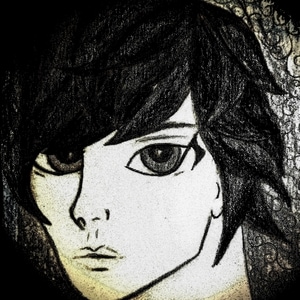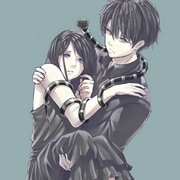The list of the dead covered three pieces of parchment. The longest he had ever had to deliver. Areti swallowed, ignoring the burn from the lump in his throat, and wandered up the stone steps towards the makeshift barracks. The pale pillars would have once heralded him as someone important, but now they sat as scared and wary as those they protected.
Along with the list were the other letters he had to deliver, war information and friendly notes between soldiers. For some of those letters, the owner was already dead and Areti was passing on their final words to someone grief-stricken and lonely. It was the worst part of his job.
Soldiers nodded to him, already well aware of why he was there. News of the battle would have passed from camp to camp, the whispers slowly making their way to where their general sat, waiting for official news from Areti. Would they be as heartbroken over the three pieces of paper that sat in Areti’s messenger bag or would she be as uncaring as the soldier who had originally handed it to him?
The fortress of Pethra, barely large enough to fit the warriors crammed inside, stood tall over him as he passed through the wide open double doors. One of the final protections to the country proper, it was situated high on a hill and hard to get to, well protected from the neighbouring kingdoms that sought to infiltrate.
It was the single place Areti could find where he was safe. A life carrying messages from camp to camp wasn’t a pleasant one, but it was better than running headlong into the enemy’s sword. Especially for one such as him, a man blessed by the Gods with swiftness.
Warriors followed him from the fortress’s inner courtyard under orders from their generals. An assembly, run by Areti himself, so that the people around him could learn which of their friends had passed in the battle to the south. That kind of pressure had once been too much for him, but after years of war, he had grown far too used to it.
The great hall was quiet when he entered, despite the soldiers sitting at the tables that lined the length of it. Once, it would have been lavishly decorated for feasts and celebrations, but the noble family that had lived there had long since evacuated when the army requested use of the building. Or, they were dead. Areti had no way of knowing for sure.
At the front of the room stood two generals, who regarded his dirt-stained uniform with a mix of disdain and sympathy. They gestured for him to come forward, to climb the two steps and join them before the crowd.
The list of the dead was heavy in his hands when he pulled it from his bag. He dared not read it out, not until he was given the go ahead and the lump in his throat was given permission to pass.
Areti looked out over the crowd, searching for the one familiar face he knew. It lay towards the back of the crowd, helmet gone and braided hair sitting out for the world to see. Petros met his gaze, and while they seldom smiled, they still usually looked upon Areti with what he could assume was friendliness.
That was not the expression he saw when he looked at his friend. All of it was unfamiliar, but he had seen it enough to recognise it as fear, as concern, as bone deep despair. Petros too, was waiting to hear a name and collapse to their knees with grief.
A hand on Areti’s shoulder gave him the signal to speak. When he had first started the awful job, he would predate it with apologies and a vague introduction. After four years of fighting and hundreds of sheets of parchment, there was no reason to. Everyone knew what would come spewing from his lips.
Some of the names were familiar, generals and captains that had been overwhelmed in a battle he had only seen the aftermath of. He knew none of them personally. He was nothing more than a messenger, someone to relay to lengthy information of war, and then be on his way again.
With every name he spoke, he glanced over to Petros. His friend in the back of the room, silent and waiting, gave no reaction. Relief sunk like a stone in Areti’s gut, shrouded in guilt. He was reading the names of the dead, there should be no relief.
Someone at the front of the crowd fell to their knees, cradled by the man next to them. More names fell into the stale air of the once grand hall, joined by sobs and enraged cries. The room filled with grief, a heavy weight on the shoulders of hundreds of warriors. They all felt it, whether they knew the name or not.
Later, some would yell at him, scream at him as if he had been the ones to kill the people they knew. They merely wanted a release, but even they knew that throwing punches at him would do nothing. He could not bring them back, he had not killed them, all he did was read out a name on a piece of parchment. But that was later, and he still had another page to get through.
Before he knew it, he was at the bottom of the page. He scoured the crowd for Petros and couldn’t find them in the small space they had been at the back. Eyes wide, Areti felt his relief turn into the sharp twist of panic that followed him most days on his journeys between camps.
Had one of the names been someone Petros knew? Were they collapsed on the floor with others, hidden by those still standing?
No. Petros stood off to the side, arms crossed over the front of their chiton. Sadness swam in their eyes, but nothing that said that they recognised a name. In fact, there was a set of their shoulders, something akin to relief. They had known someone in the camp to the south, someone who was still alive.
Areti swam with relief and tried not to let it show in front of the other warriors. He stashed the pages back in the bag to burn later and stepped down from the stairs without a look at the generals. Letters fluttered into his grip, names written on the front of the envelopes. He had memorised most of them after so long and knew which name belonged to which soldier.
He moved through the group of grey chitons and sharpened swords, polished helmets and barely-used spears. Letters fell from his fingers to those around him with barely audible whispers. Most were thanks for him, some were apologies from him to the ones who lay in another's arms or sat on the ground. They looked as if they’d been injured. Maybe they were, just not in any visible way.
Then at the bottom of the bag was a name he rarely saw on an envelope. Petros. There were others there, names he didn’t know by heart yet. Petros would have to wait until last, lest he get distracted by conversation and appear rude to those grieving.
Moving from the crowd, he called out the unfamiliar names. People moved forward, men and women and everything in between, taking the envelopes from him with quiet mutters and torn faces. He had no idea what any of the letters said, he never checked. The people who gave them to him trusted him with their privacy, unless it was something to do with the war effort.
Then all that was left was Petros’s letter. His friend stood off to the side still, watching as the other warriors dispersed in awful silence. Their face was still, almost to the point of seeming unsympathetic, but their eyes held a hundred different emotions in them.
“Petros,” Areti said, standing before them before he even realised it. “None of those names on the list were for you.” A statement, not a question. A relief, not a despair.
“No, but I’m assuming that is,” Petros replied in a familiar rumble Areti hadn’t heard in weeks. The envelope hung in the air between them, barely grasped in Areti’s thin fingers. Petros’s name was written in a messy scrawl, hastily written so that it could be shoved in Areti’s bag before he had to leave. He could not remember the face that had given it to him, not in the sea of people he saw at every camp.
He handed it over, watched the way Petros opened it with shaking fingers and the way their face changed so uncharacteristically that Areti had to take a step back. A frown, a smile, relief and happiness and longing all in the lines of a face that usually never moved.
“Petros?” he said again, reaching out a hand only to stop halfway through the distance between them.
A curious hum rose from Petros’s throat, filling the silence of the hall for a brief second. “It’s from Ambrus. I… It’s been a while since I’ve heard from him. I thought…”
“He’s not on my list,” Areti said. He had never heard the name before, not during any of his small conversations with Petros.
“And I hope he never is,” they replied, eyes scouring the page and the words that had been scratched on with quill and ink. Rare joy made a mask on their face, a joy not even Areti’s appearances could create.
The question fell from his lips before he could stop it. “Who is he?”













Comments (6)
See all